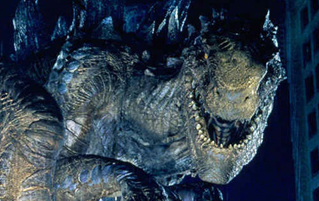How America Has Screwed Up Godzilla For Decades

This weekend sees the release of Godzilla: King Of The Monsters, starring Tywin Lannister, Eleven from Stranger Things, and one of the dudes from Silicon Valley (because apparently this movie was produced by a TV Guide crossword puzzle). The latest iteration of the classic movie monster is one of just a handful of American Godzilla movies. And in retrospect, most of them totally betray the theme of the original Japanese film. No, we're not just talking about how Puff Daddy awkwardly rapping alongside a middle-aged Jimmy Page would be a slap in the face to any film series.
As we've mentioned before, 1954's Gojira was a potent metaphor for Japan's collective anxiety surrounding nuclear power. Godzilla is a destructive force that lays waste to cities and was awakened by nuclear weapons tests. The ensuing carnage is obviously reminiscent of the bombings of Hiroshima and Nagasaki, which occurred less than a decade earlier.
But the movie also pointedly references an incident that happened earlier in '54, when the crew of a fishing boat, the Daigo Fukuryu Maru (which translates as "Lucky Dragon 5") was exposed to the fallout of a U.S. hydrogen bomb being tested in Bikini Atoll. The ship's radio operator died, the Japanese fishing industry imploded, and the U.S. falsely accused the crew of being spies. So how does Gojira begin? With a Japanese boat being destroyed by a mysterious explosion.

It wasn't long before the U.S. swooped in to crap all over Gojira's anti-nuclear messaging. 1956 saw the release of Godzilla, King Of The Monsters!, the original film reedited for American audiences. Not only did it cut 20 minutes of footage, but it also added new scenes featuring Raymond Burr, who would go on to play TV's Perry Mason and the Rear Window's guy who should have invested in some damn curtains. In the new edit, the entire story is told from an American's point of view. The allegorical villains of the original suddenly claimed ownership over the story.

After years of lobbying Toho Studios for another American version of Godzilla, Hollywood finally got its chance in the '90s. Early stabs at the script found Godzilla being awakened not by American nuclear tests, but by a nuclear reactor that had been illegally discarded by the Soviet Union. The movie finally came out in 1998 and featured Matthew Broderick, Hank Azaria, and a whole lot of barely concealed embarrassment.
This film revived the idea of Godzilla's origin being nuclear weapons tests, though here he's some kind of mutated iguana. Rather than acknowledge America's role in the historical misdeeds that inspired the character in the first place, it lays the blame for all this nuclear frivolity on everyone's favorite scapegoat: those beret-wearing, baguette-devouring Frenchmen!


For the 2014 reboot, Godzilla's origins were modified yet again. They go back to the idea of American nuclear testing in the South Pacific, but oddly, it reveals that these detonations were "not tests," but covert attempts to kill Godzilla.


This recontextualizes the very tests that poisoned a bunch of Japanese people in 1954 (and were directly condemned in Gojira) as a secretly heroic act. Director Gareth Edwards called this a "nod to the original" which seems misguided at best.
The 2014 movie features other Kaiju (MUTOs), who feed on nuclear energy and cause a catastrophic meltdown in Japan. In the end, Godzilla has to fight these monsters, and is ultimately hailed as humanity's savior. This is seemingly a reference to the Japanese series, which gradually evolved Godzilla into an occasional "defender of the Earth," protecting Japan from aliens and such. But here he's protecting Americans. So the story concludes with the U.S. Army thankful that they unleashed a giant destructive nuclear force to justifiably defeat a threat that's literally from Japan. Given the political context of the original movie, that's pretty messed up.
You (yes, you) should follow JM on Twitter!
For more, check out 'Pokemon Sleep' Finally Makes Parenting Obsolete and Disney's Star Wars Land Is Here To Force-Choke Your Wallet.
Also, we'd love to know more about you and your interesting lives, dear readers. If you spend your days doing cool stuff, drop us a line at iDoCoolStuff at Cracked dot com, and maybe we can share your story with the entire internet.
Follow us on Facebook. It's free.